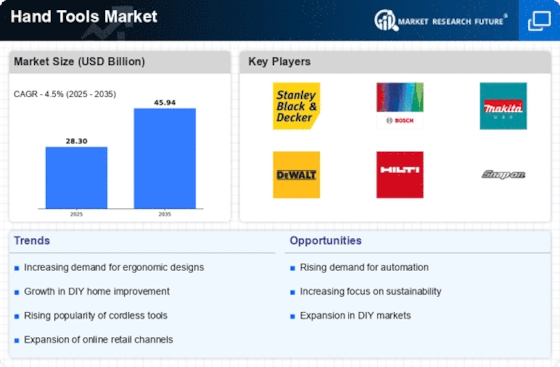Top Industry Leaders in the Hand Tools Market

The Competitive Landscape of the Hand Tools Market:
The global hand tools market is a dynamic environment with a projected growth. This growth is fueled by ongoing construction activity, particularly in the Asia-Pacific region, and the increasing popularity of DIY projects. However, the landscape is fiercely competitive, with established players and new entrants vying for market share. Here's a closer look at the key elements shaping this market's competitive scenario.
Key Players:
- Akar Tools Limited
- Snap-On Incorporated.
- Stanley Black and Decker
- Techtronic Industries Co. Ltd.
- Wera Tools
- Apex Tool Group
- Klein Tools Inc.
- Channellock, Inc.
- JCBL India
- Emerson Electric Co.
Strategies Adopted by key players:
The market is dominated by a handful of well-recognized brands like Stanley Black & Decker (including Dewalt), Apex Tool Group, Snap-on, and Techtronic Industries (TTI) (including Milwaukee). These companies have established themselves through a combination of factors:
-
Brand Recognition: They hold a strong brand reputation for quality, reliability, and durability, especially within the professional and industrial segments. -
Extensive Distribution Networks: They have built robust distribution channels, ensuring their products are readily available in hardware stores, industrial suppliers, and online retailers. -
Product Diversification: They offer a comprehensive range of hand tools catering to various needs, from basic DIY kits to specialized industrial sets. -
Focus on Innovation: Leading companies invest heavily in research and development to create innovative tools with improved ergonomics, functionality, and material science.
Factors for Market Share Analysis:
To assess a company's position within the competitive landscape, several key metrics are considered:
-
Market Share: This reflects the percentage of total sales a company holds within a specific segment or the entire market. -
Product Portfolio Breadth: The wider the variety of tools offered, the more comprehensive a company's solution becomes, potentially attracting a broader customer base. -
Brand Recognition and Reputation: A strong brand name associated with quality and reliability can command premium pricing and higher customer loyalty. -
Distribution Network Reach: Effective distribution ensures tools are readily available to customers, influencing purchasing decisions. -
Innovation and New Product Development: Companies that consistently introduce new, improved tools can stay ahead of the curve and attract customers seeking the latest technology.
New and Emerging Companies:
While established players hold a significant market share, new entrants are making their mark by:
-
Targeting Niche Markets: They focus on specific segments, like specialty tools for electricians, plumbers, or HVAC technicians, offering a more targeted value proposition. -
Direct-to-Consumer (D2C) Sales Model: By bypassing traditional retailers, they can potentially offer competitive pricing and cater directly to online customer preferences. -
Emphasis on Ergonomics and Design: Newer brands may prioritize user comfort and sleek aesthetics, appealing to design-conscious DIYers. -
Focus on Sustainability: Sustainability-conscious companies are using recycled materials or offering eco-friendly packaging to resonate with environmentally responsible consumers.
Industry Developments:
-
Techtronic Industries Co. Ltd (January 5, 2024): Released a new line of hand tools focused on professional users, emphasizing durability and performance. -
Wera Tools (Throughout 2023): Continued its focus on ergonomic design and launched several new screwdrivers and wrenches praised for user comfort.










